Past Events
Interested in Cotsen events? Sign up for our mailing list.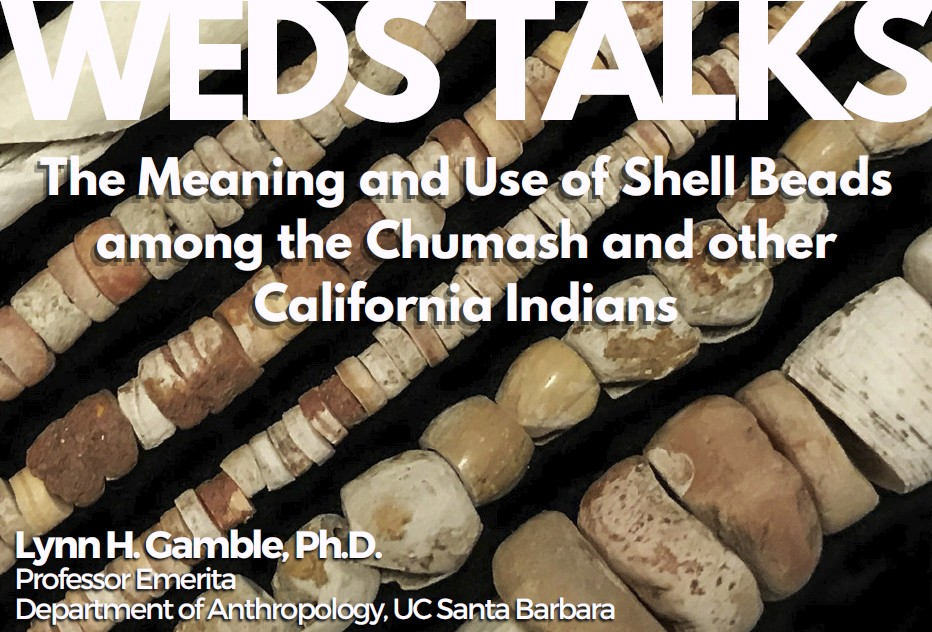
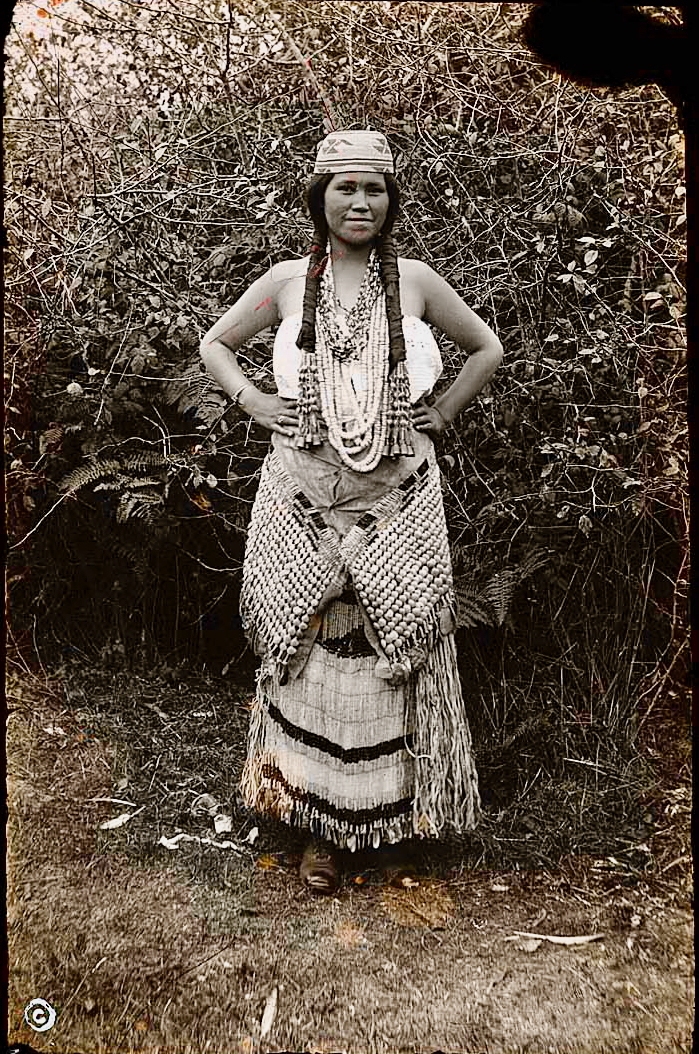
ABSTRACT: The Chumash Indians of southern California made and used beads of stone, bone, and shell for over 8,000 years, but what did they use them for? Beads were used as a form of adornment and eventually as a currency. They also served to integrate people separated by long distances. In some areas of California, beads were brought for regularly scheduled feasts to help with the expenses of the dancers, musicians, and the food provided. More than 22 species of shell beads can be found in California. Some types were used as money by the Chumash. Beads made on the Northern Channel Islands were traded widely, as far as the Bay Area and even the Southwestern United States. The context and shifting uses of beads are reviewed, and an earlier date for the first use of money in North America is proposed.
BIO: Lynn H. Gamble is Professor Emerita of Anthropology at the University of California, Santa Barbara and has been active in anthropological archaeology, with a focus in California, for over 45 years.
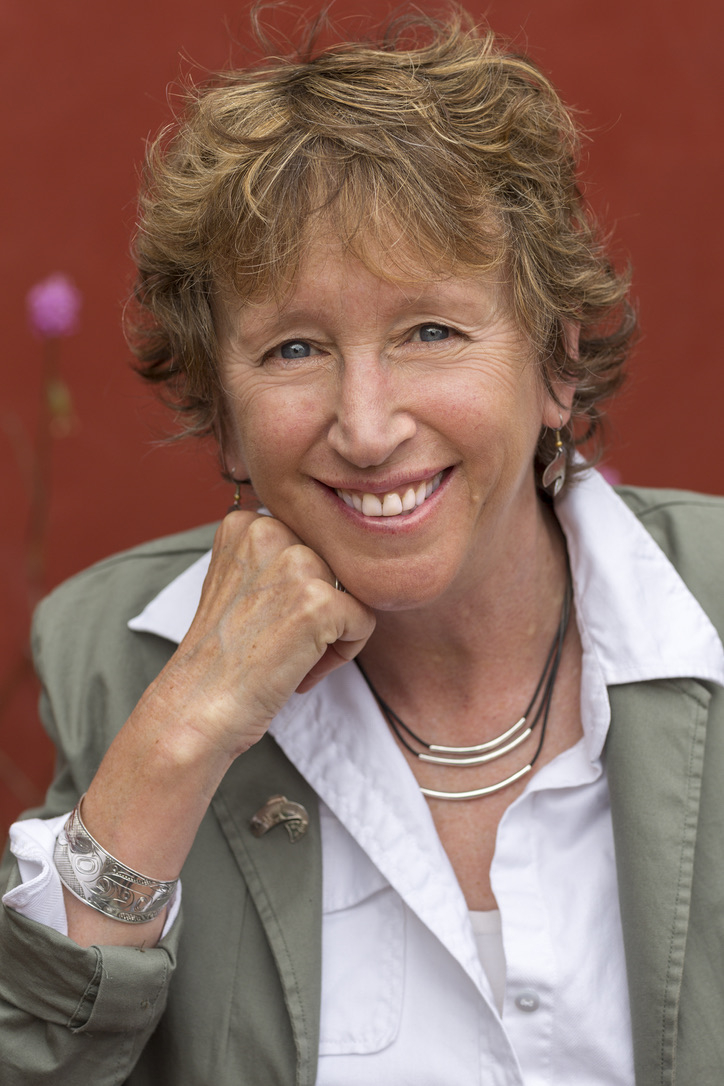 Her interests include shell bead money and ornamentation, emergence of inequality, cultural and ritual landscapes, social identity, mortuary patterns, long distance exchange, ritual and sociopolitical complexity, culture contact, climate change, and long-term transformations among hunter-gatherer societies. She focuses on the archaeology of the Santa Barbara Channel region and the emergence of complexity among hunter-gatherers. One of her significant publications is the book The Chumash World at European Contact: Power, Trade, and Feasting Among Complex Hunter-Gatherers with University of California Press. In addition, she is author of over 70 articles, chapters, edited volumes, and monographs. Recent articles that focus on shell beads include “The Origin and Use of Shell Bead Money in California" (2020) and “Navigating Cooperative Marketplaces: the Chumash Indians and the Dynamics of Hunting/Gathering/Fishing Economies” (2025).
Her interests include shell bead money and ornamentation, emergence of inequality, cultural and ritual landscapes, social identity, mortuary patterns, long distance exchange, ritual and sociopolitical complexity, culture contact, climate change, and long-term transformations among hunter-gatherer societies. She focuses on the archaeology of the Santa Barbara Channel region and the emergence of complexity among hunter-gatherers. One of her significant publications is the book The Chumash World at European Contact: Power, Trade, and Feasting Among Complex Hunter-Gatherers with University of California Press. In addition, she is author of over 70 articles, chapters, edited volumes, and monographs. Recent articles that focus on shell beads include “The Origin and Use of Shell Bead Money in California" (2020) and “Navigating Cooperative Marketplaces: the Chumash Indians and the Dynamics of Hunting/Gathering/Fishing Economies” (2025).
Contact Sumiji Takahahshi
Email sutakahashi@ioa.ucla.edu
Phone 310-825-4169
On Saturday, February 7, from 11:00am-2:00pm, the Cotsen Institute will host its second annual Archaeology Day for K–12, welcoming students from schools across Los Angeles. This event is organized in collaboration with the undergraduate Archaeology Club and will feature hands-on activities such as a dig box, pottery reconstruction, rock art wall painting, and a photo booth.
At 1:00pm we will host the Annual Ernestine Elster Lecture in Lenart Auditorium. This year’s speaker will be Dr. Julien Riel-Salvatore (Département d’anthropologie, Université de Montréal), who will present his talk, “Red rocks, white sands, and dark caves: Snapshots of the human adventure in Paleolithic Italy".
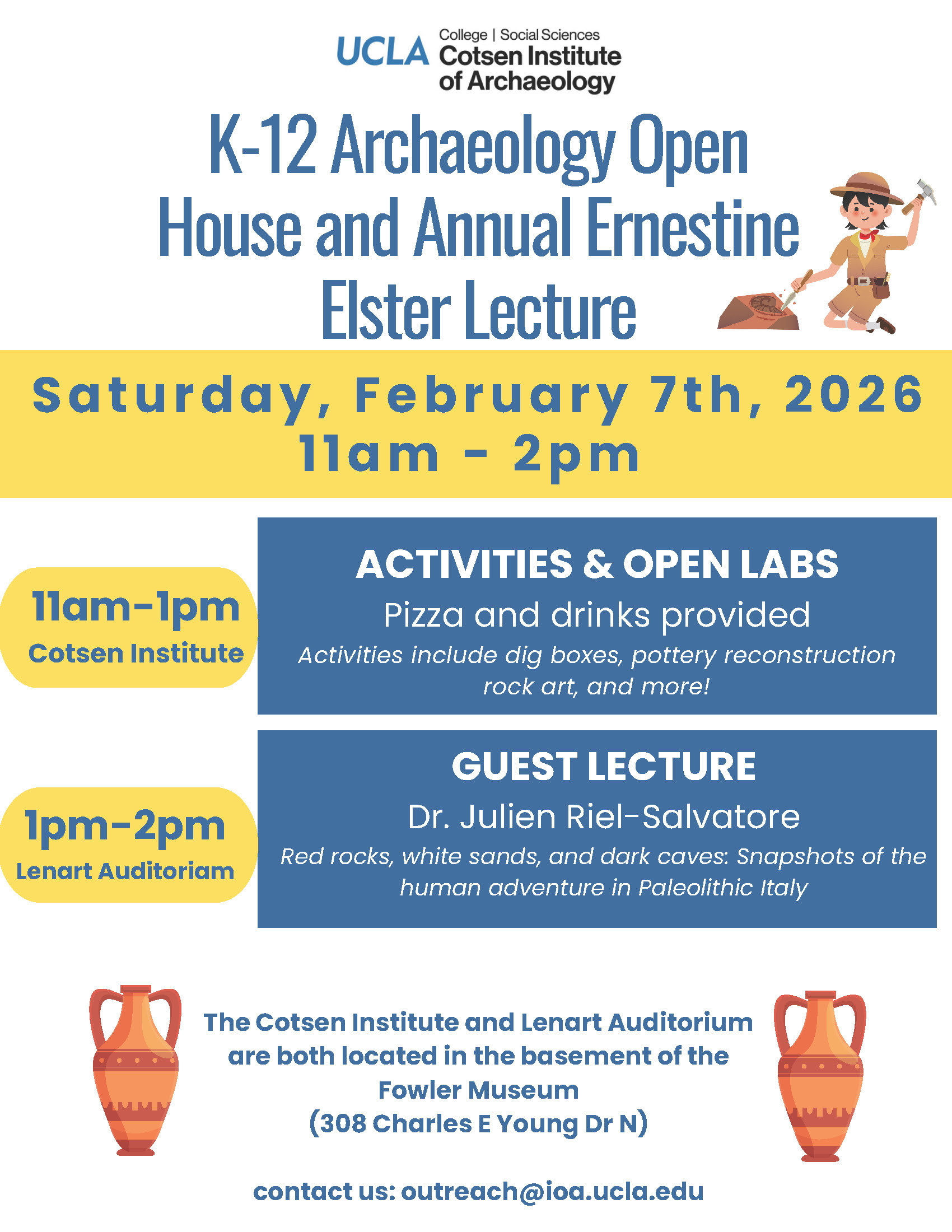
Contact Victoria Newhall
Email outreach@ioa.ucla.edu
Phone
The Refugee Material Culture Initiative (RMCI) is a community-engaged digital humanities project that rethinks how refugee histories are preserved and shared. Instead of relying on institutions to define what matters, RMCI works with refugee communities to decide which objects are preserved, how their stories are told, and how they are made accessible through digital surrogates, virtual exhibits, and educational resources.
This talk introduces RMCI through its first partnership with the Vietnamese Heritage Museum in Westminster, California, and shows how institutional resources—technology, expertise, and infrastructure—can be leveraged to support community-led preservation and storytelling. The presentation will also feature brief reflections from three artifact donors—Nguyễn Thanh Thủy, Nguyên Chí Long, and Lê Trị—who will speak about their objects and the experience of seeing their histories digitally preserved.
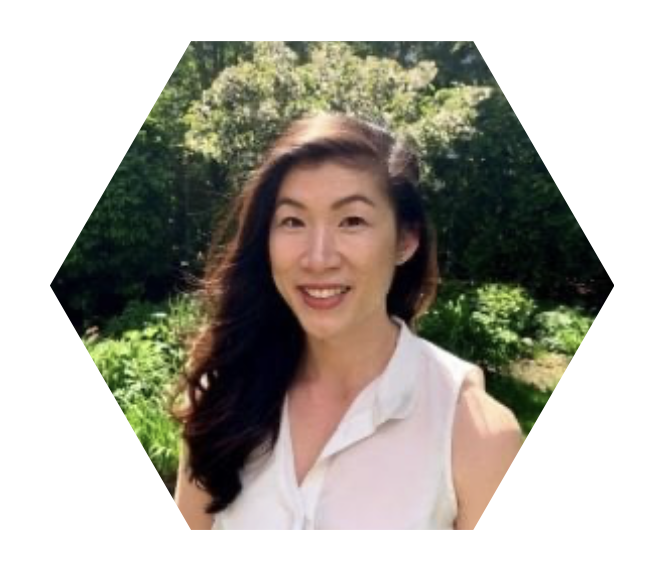 Kelly Nguyen
Kelly Nguyen
Assistant Professor
Classics
Contact Perla Torres
Email perla@ioa.ucla.edu
Phone
The Andean Working Group presents "La Metalurgia Andina: De Insignia de Poder a Motor Económico de la Colonia" by Dr. Luisa Vetter, Faculty in the Humanities Department at the Pontificia Universidad Católica del Perú.
Register at tinyurl.com/AWGVetter
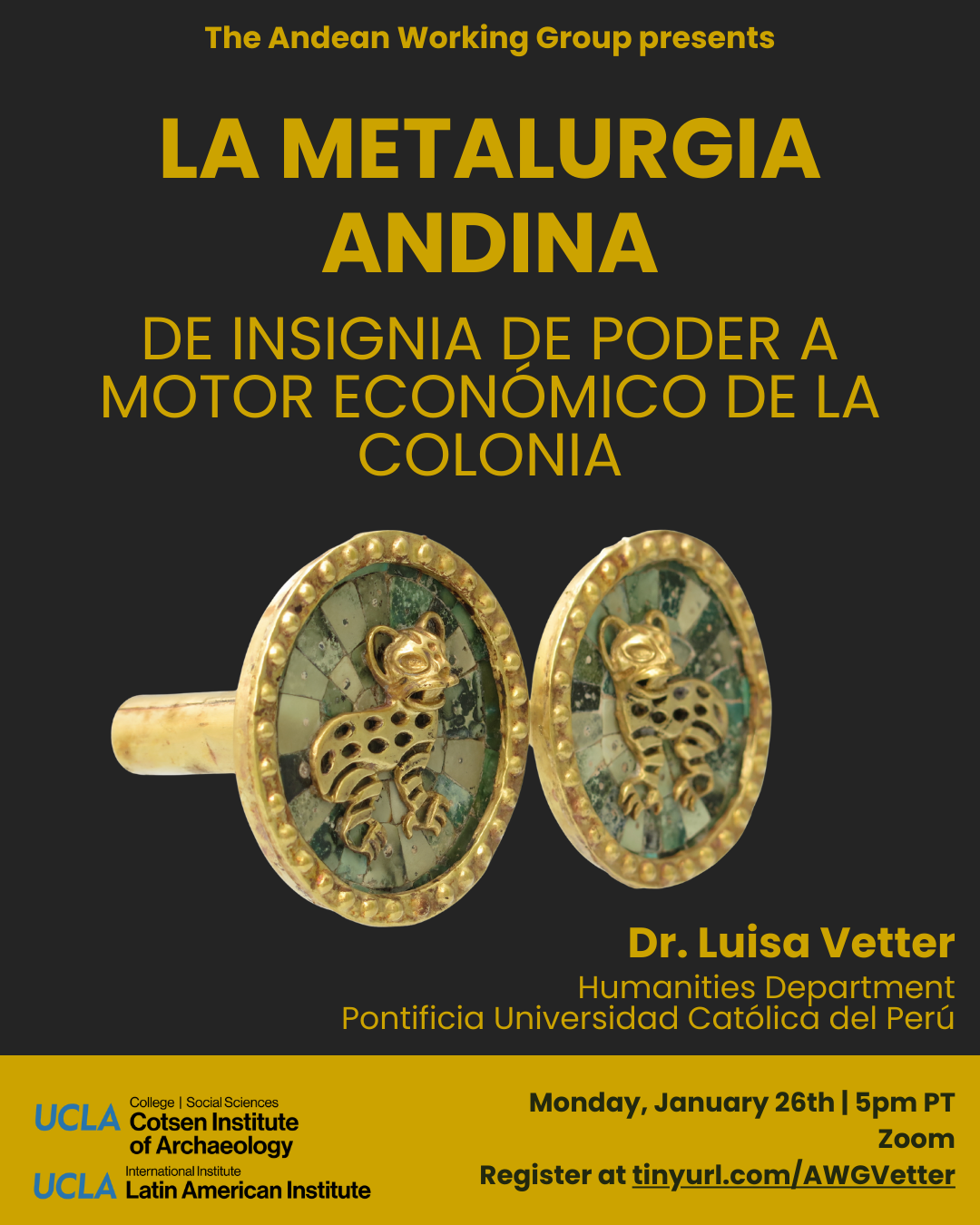
This event is co-sponsored by the UCLA Latin American Institute and the Cotsen Institute of Archaeology.
Contact Alba Menéndez Pereda
Email albamenendez@ucla.edu
Phone
Join the Cotsen Institute of Archaeology Press to celebrate the publication of The Kahramanmaraş Valley Survey: A Crossroads Along the Syro-Anatolian Frontier. This survey presents a study of local landscape histories in the Kahramanmaraş valley—a previously understudied, but pivotal, crossroads along the Syro-Anatolian frontier. The Holocene vegetation history is explored in relation to climatic changes and human impact through the pollen analytical results of a deep core obtained from a former Sağlık (Gavur) lakebed. Extensive surface surveys carried out in the region between 1993 and 2000 form the basis of the settlement pattern studies beginning with the first permanent settlement of the valley in the Neolithic, and ending with the Islamic era. Including results of a series of intensive full coverage and transect surveys around Domuztepe, the analysis of a long historical record, diverse physical environment, and a significant number of archaeological sites are used to outline the myriad ways the ancient residents of this region between Syria and Anatolia made it their home for over seven thousand years
Elizabeth Carter was a Professor of Near Eastern Archaeology in the Near Eastern Languages and Cultures Department at UCLA and a former Chair of the Department and of the Archaeology Program. She is presently a Professor Emerita and Research Professor in the department. She has done archaeological fieldwork in Iran, Iraq and, since the late eighties, in the southeastern region of Türkiye . She began her survey of the Karamanmaraş region in 1993 in co-operation with the local museum. The present volume presents the results of surface and environmental studies carried out in the region.
Contact Perla Torres
Email perla@ioa.ucla.edu
Phone

ABSTRACT: This talk presents research I have been developing since 2019 on the former House of Detention of São Paulo, commonly known as Carandiru. In 1992, a police operation resulted in the deadliest recorded prison killing in Brazilian history. Days later, the government acknowledged the deaths of 111 incarcerated men. Since then, this number has been contested by survivors and
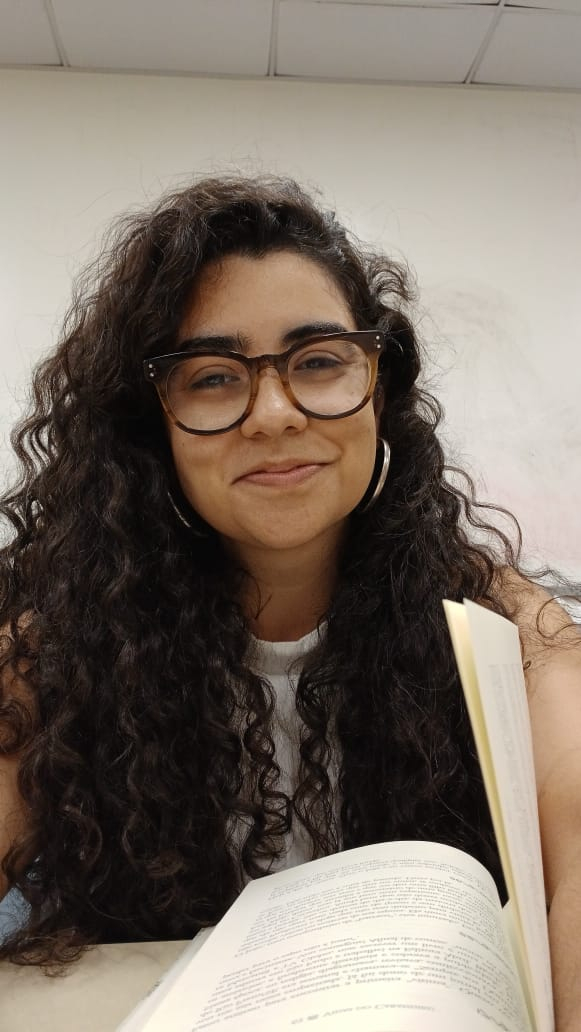 witnesses, although it has never been formally incorporated into legal proceedings. My research examines how these informal allegations can guide an investigation of the remaining material traces of Carandiru, asking how claims of human rights violations are expressed in material evidence. The project combines methods from forensic anthropology, urban archaeology, and material culture studies. Preliminary findings point to public tolerance of everyday violence, institutional complicity, the lack of control inside the prison, the destruction or concealment of evidence, and multiple problems in the postmortem examination reports. Together, these elements may contribute to questioning the official death count. By strengthening survivor accounts as valid lines of evidence, this work also raises methodological challenges: how can researchers document and analyze material evidence when the State itself participates in its erasure, deploying sophisticated mechanisms of disappearance under the veneer of legality?
witnesses, although it has never been formally incorporated into legal proceedings. My research examines how these informal allegations can guide an investigation of the remaining material traces of Carandiru, asking how claims of human rights violations are expressed in material evidence. The project combines methods from forensic anthropology, urban archaeology, and material culture studies. Preliminary findings point to public tolerance of everyday violence, institutional complicity, the lack of control inside the prison, the destruction or concealment of evidence, and multiple problems in the postmortem examination reports. Together, these elements may contribute to questioning the official death count. By strengthening survivor accounts as valid lines of evidence, this work also raises methodological challenges: how can researchers document and analyze material evidence when the State itself participates in its erasure, deploying sophisticated mechanisms of disappearance under the veneer of legality?
BIO: Marília Oliveira Calazans is a staff researcher at the Center for Forensic Anthropology and Archaeology (CAAF–Federal University of São Paulo). She is a PhD candidate in Archaeology at the University of São Paulo, currently completing a Fulbright-supported visiting research period at UCLA. Her work focuses on investigating and producing evidence of State violence. Her research moves across Archaeology, History of Science, Cultural Heritage, Forensic Anthropology, and Human Rights.
Contact Sumiji Takahahshi
Email sutakahashi@ioa.ucla.edu
Phone 310-825-4169
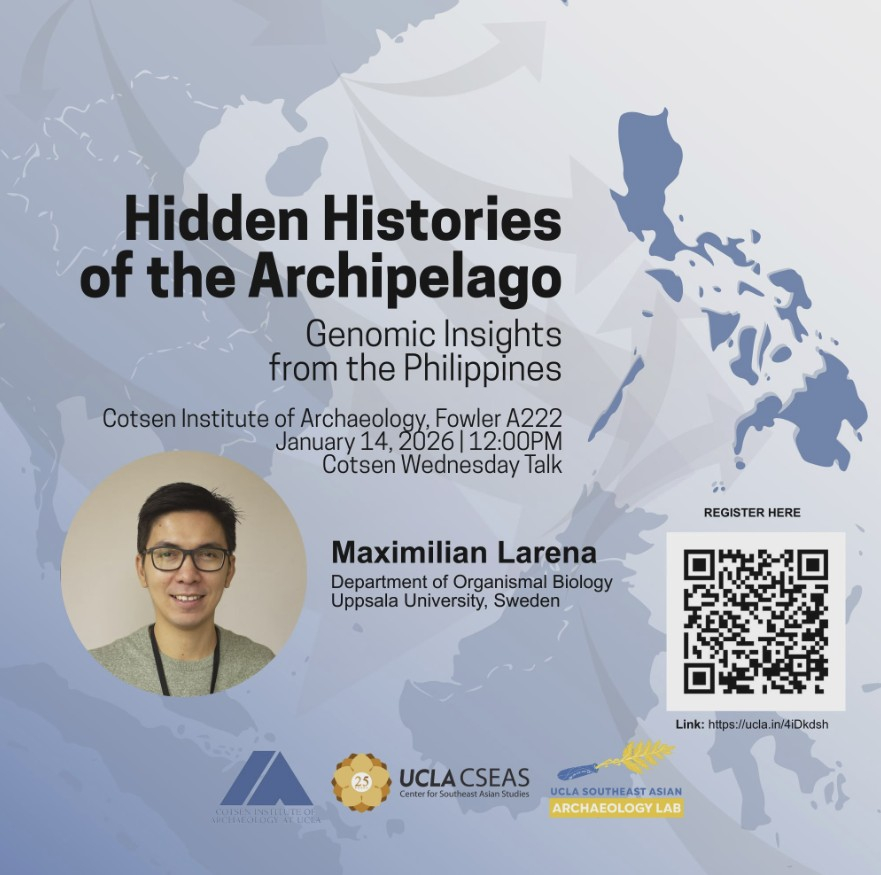
Contact Sumiji Takahahshi
Email sutakahashi@ioa.ucla.edu
Phone 310-825-4169
Professor William Schniedewind's talk situates the remarkable archaeological site at Tell Shaddud at the crossroads of history—Armageddon, the strategic gateway of the Jezreel Valley. Excavations reveal fortresses that mark shifting powers: an Egyptian stronghold, an early Israelite administrative center, a neo-Assyrian fortress, and later a Jewish village from the Roman period, living in the shadow of the Roman legionary camp at Legio. The story continues into modern times, with traces of a British Mandate army trench and defenses of the Haganah. This lecture demonstrates how Tell Shaddud’s layers embody the enduring relationship between the land and its people, showing archaeology’s power to illuminate resilience, identity, and continuity across millennia and into modern times.
Learn More & RSVP: https://bit.ly/UCLA_Jan-13_Excavating-Tell-Shaddud
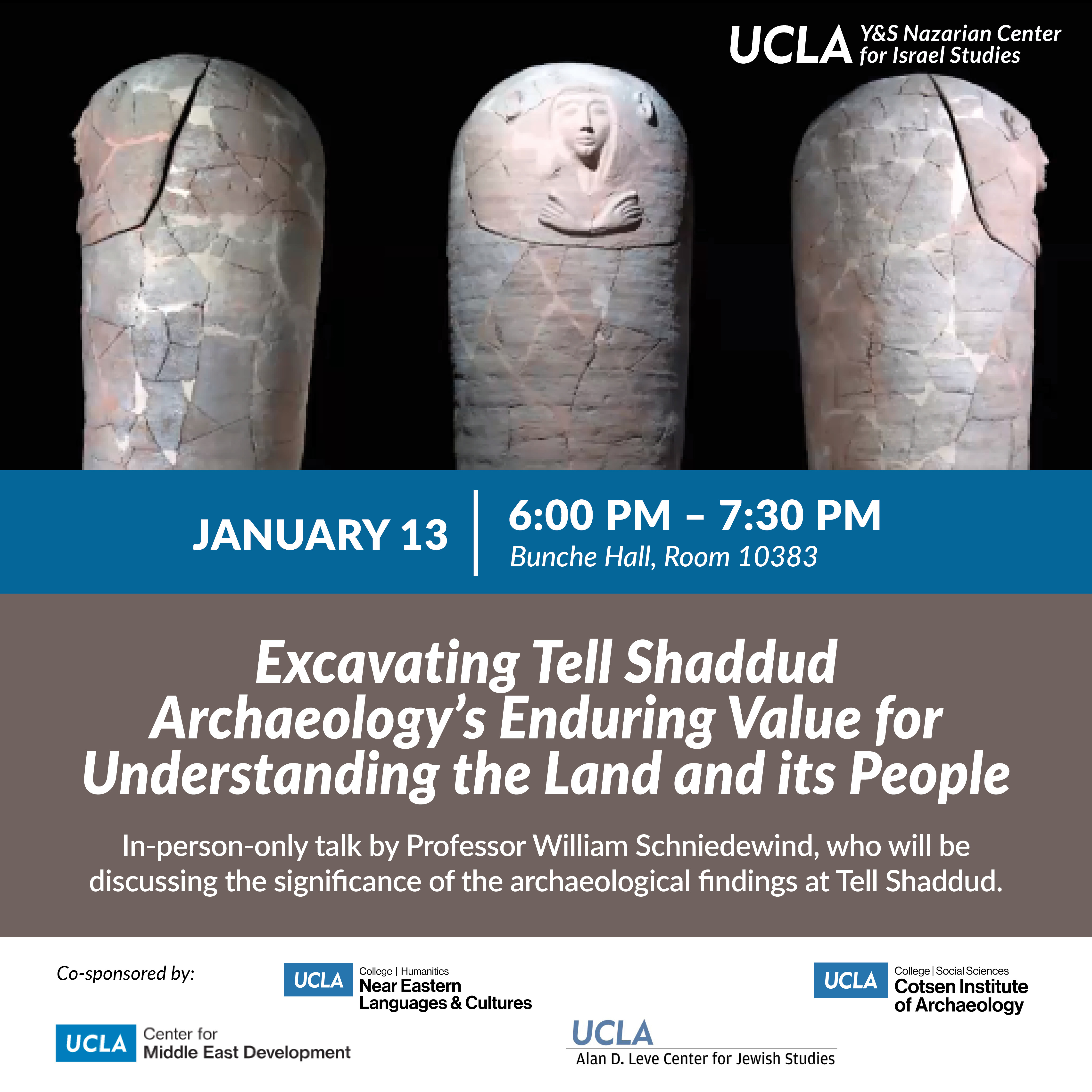
 William Schniedewind is Professor of Biblical Studies at UCLA, and the Sady and Ludwig Kahn Director of the Alan D. Leve Center for Jewish Studies. He received his Ph.D. in Near Eastern and Judaic Studies from Brandeis University, has been a Visiting Scholar at the Hebrew University and a Research Fellow at the Albright Institute of Archaeological Research in Jerusalem, and is the Associate Director of the excavations at Tell Shaddud. He served for many years as the Chair of the Department of Near Eastern Languages and Cultures at UCLA. He is the author of numerous articles and seven books including How the Bible Became a Book (Cambridge University Press, 2004), A Social History of Hebrew (Yale University Press, 2013), The Finger of the Scribe: How Scribes Learned to Write the Bible (Oxford University Press, 2019), and Who Really Wrote the Bible: the Story of the Scribes (Princeton University Press, 2024).
William Schniedewind is Professor of Biblical Studies at UCLA, and the Sady and Ludwig Kahn Director of the Alan D. Leve Center for Jewish Studies. He received his Ph.D. in Near Eastern and Judaic Studies from Brandeis University, has been a Visiting Scholar at the Hebrew University and a Research Fellow at the Albright Institute of Archaeological Research in Jerusalem, and is the Associate Director of the excavations at Tell Shaddud. He served for many years as the Chair of the Department of Near Eastern Languages and Cultures at UCLA. He is the author of numerous articles and seven books including How the Bible Became a Book (Cambridge University Press, 2004), A Social History of Hebrew (Yale University Press, 2013), The Finger of the Scribe: How Scribes Learned to Write the Bible (Oxford University Press, 2019), and Who Really Wrote the Bible: the Story of the Scribes (Princeton University Press, 2024).
 Aaron A. Burke (moderator) is Professor of the Archaeology of Ancient Israel and the Levant, and the Kershaw Chair of the Ancient Eastern Mediterranean Studies in the Department of Near Eastern Languages and Cultures. He is a member of the Cotsen Institute of Archaeology at The University of California, Los Angeles, where he also serves as editor-in-chief. His research interests address the social history of the Levant and Eastern Mediterranean during the Bronze and Iron Ages with a particular interest in identity transformations in connection with warfare, forced migration, and long-distance exchange. Since 2007, he has directed The Jaffa Cultural Heritage Project, an NEH-funded excavation and publication program. His current research seeks to address the Early Iron Age in the southern Levant, ca. 1200–900 B.C., the period of the rise of early Israel. In connection with this research, between 2018 and 2023 he co-directed excavations with David Ilan of Hebrew Union College at Tel Dan in northern Israel. He is the founding series editor for The Elements in the Archaeology of Ancient Israel, published by Cambridge University Press.
Aaron A. Burke (moderator) is Professor of the Archaeology of Ancient Israel and the Levant, and the Kershaw Chair of the Ancient Eastern Mediterranean Studies in the Department of Near Eastern Languages and Cultures. He is a member of the Cotsen Institute of Archaeology at The University of California, Los Angeles, where he also serves as editor-in-chief. His research interests address the social history of the Levant and Eastern Mediterranean during the Bronze and Iron Ages with a particular interest in identity transformations in connection with warfare, forced migration, and long-distance exchange. Since 2007, he has directed The Jaffa Cultural Heritage Project, an NEH-funded excavation and publication program. His current research seeks to address the Early Iron Age in the southern Levant, ca. 1200–900 B.C., the period of the rise of early Israel. In connection with this research, between 2018 and 2023 he co-directed excavations with David Ilan of Hebrew Union College at Tel Dan in northern Israel. He is the founding series editor for The Elements in the Archaeology of Ancient Israel, published by Cambridge University Press.
Contact Gage Greenspan
Email gagegspan@g.ucla.edu
Phone
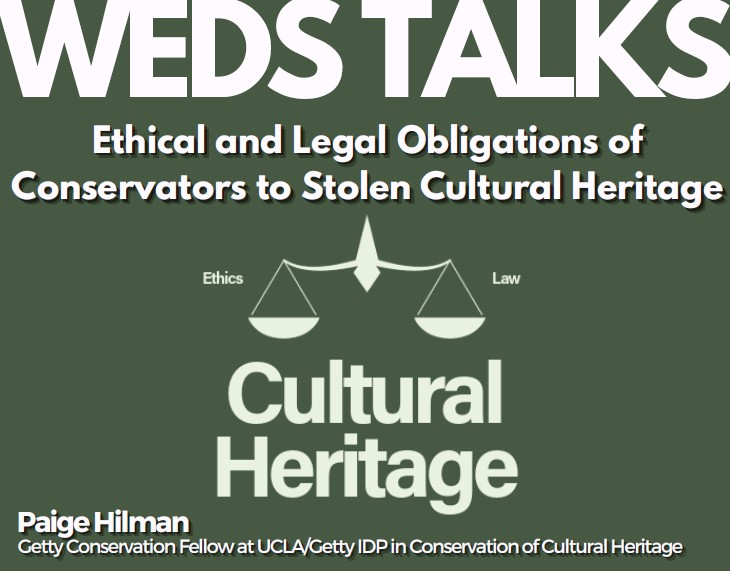
ABSTRACT: Conservators have a responsibility to care for and protect cultural heritage materials. When it comes to the illicit trafficking of cultural heritage materials, there are many opinions throughout conservation about what to do in the case of treatment. As will be discussed, there are formal ethical guidelines for the profession of both conservators and museums. In order to fulfill these professional responsibilities, conservators may be tempted to knowingly treat illicitly trafficked cultural heritage property as a preventative measure. This is done with a genuine hope that one day this cultural heritage will be recovered, and by treating it now, the object has a better chance of surviving to that point. This is also grounded, in part, by the history of unethically but legally acquired cultural heritage in museums that conservators are responsible for caring for. In comparing these ethics with the legal framework within the United States, this talk will explore what, if any, are conservators’ ethical obligations to stolen artifacts and, in practice, what are the legal risks associated with treating a potentially stolen object.
BIO: Paige Hilman received her BA in Art History with a minor in Arts Administration from the University of Arizona and certificate in Field Archaeology from Pima Community College. Prior to starting her MA, she worked with the National Park Service as a Conservation Assistant, serving the Intermountain Region. Her research interests include archaeological ceramics from the American Southwest, provenance research, and conservation ethics.
Contact Sumiji Takahashi
Email sutakahashi@ioa.ucla.edu
Phone 310-825-4169
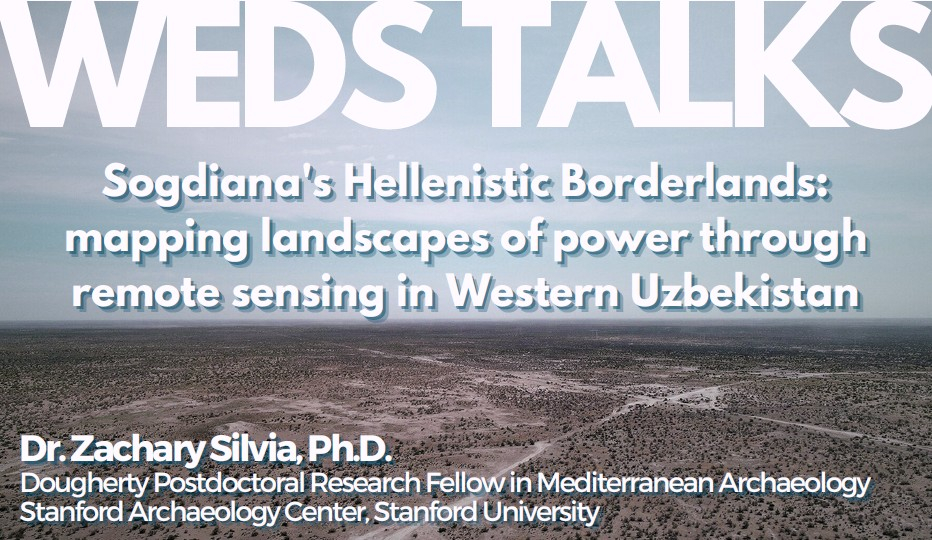
ABSTRACT: This talk presents preliminary results of ongoing archaeological research in the Kyzylkum Desert outside of the Bukhara Oasis in western Uzbekistan. From the mid-1st millennium BCE through 1st c. CE parts of the Kyzylkum desert were a vast agricultural oasis sustained by rivers and substantive canal networks, constituting the westernmost extent of ancient Sogdiana. After the arrival of Greco-Macedonians with Alexander of Macedon western Sogdiana experienced substantial intensification that reached its crux under the archaeologically elusive Kangju empire at the turn of the 1st millennium CE. Then substantial rural areas were rapidly abandoned. Through an ongoing, broad remote sensing survey parts of this vast, now arid agricultural oasis is beginning to emerge. These new data allow us to assess for the first time the broader ecological effects of decision-making in Central Asia’s rural frontiers during the Hellenistic and Post-Hellenistic Periods, and the role these ancient anthropogenic processes played in the formation of the modern Kyzylkum.
BIO: Zach Silvia is a landscape archaeologist focused on the impact of asymmetrical power on ancient culture and ecology in colonial and imperial contexts. At present his work focuses on two geographic contexts: ancient Hellenistic and post-Hellenistic Sogdiana (especially in the Kyzylkum desert around the Bukhara Oasis of Uzbekistan) and late Iron Age and early Roman Istria in Croatia. In both regions he explores the human effects of ecological change on rural communities enduring, appropriating, and resisting various types of colonial systems. He is also a specialist in aerial and terrestrial based remote sensing methods with a strong interest in ethical applications of non-destructive approaches to archaeological fieldwork. Zach received his Ph.D. from Bryn Mawr College in 2022. Zach was a Postdoctoral Researcher in Spatial Archaeometry and Lecturer in the Department of Anthropology at Dartmouth College (2022-23) as well as a Postdoctoral Research Associate with the Joukowsky Institute for Archaeology and the Ancient World at Brown University (2023-25).
Contact Sumiji Takahashi
Email sutakahashi@ioa.ucla.edu
Phone 310-825-4169
- 1 of 51
- next ›


